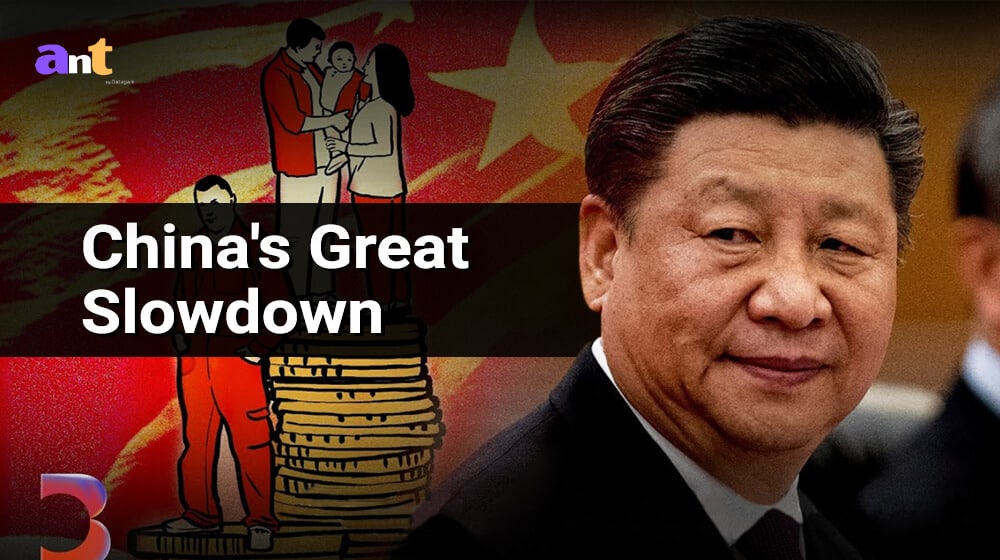
Home » Transcript Library » China’s Great Slowdown Transcript
China’s Great Slowdown Transcript
John Liu 00:04
This was supposed to be the year that China’s economy came roaring back. What we’ve had instead are signs that this economy is struggling.
Unidentified Speaker 1 00 14
[Foreign Language translated to English: I’m spending less this year]
Unidentified Speaker 2 00 16
[Foreign Language translated to English: Ordinary people are cash-strapped and feeling poor]
Narrator 00:21
Faltering growth. Soaring youth unemployment rates. An economy on the brink of deflation. After decades of a stunning economic rise, China’s challenges are mounting. So, what’s going on with the $18 trillion economy? And why does it matter to the rest of the world?
John Liu 00:43
There were COVID restrictions all across the country. And when those restrictions ended, everyone expected consumers would come back and spend. Factories would start making product again, and China would once again be the global motor for growth.
News Anchor 1 00:56
China’s economy losing further momentum.
News Anchor 2 00:59
Okay, they are out- and oh. Wow, ooh, oh, not good. All right.
Kristalina Georgieva 01:04
China slowing down of course affects Asia, affects the world.
John Liu 1:10
When we talk about why the economy is slowing now, there’s three things I would point to. One, there’s a problem with the real estate market here. The government identified that there was a bubble in property about two or three years ago, and started to take steps to try and deflate that bubble.
Rebecca Choong Wilkins 01:27
For decades, China’s booming property market has meant that owning a property is a surefire way of increasing your personal wealth. The problem was the crackdown on the property sector, cracking down on how much debt it had happened very intensively and far faster than the economy could really catch up with.
John Liu 1:47
What’s happened as a result though is now in 2023, you’ve seen a very dramatic, in some places, drop in home prices.
Unidentified Speaker 1 01:56
[Foreign Language translated to English: You lose money no matter what you invest in, and there are no signs property price will rise again.]
Unidentified Speaker 2 01:59
[Foreign Language translated to English: I want to sell all my properties, every single one of them.]
John Liu 02:04
That leads to the second point I would make, which is about confidence. When those home prices fall, even if people are not earning less in terms of salary, they are feeling poor.
Jill Disis 0:2:14
At the beginning of the year, as China reopened its borders, we were expecting to see a big flood of consumer spending, what we call revenge spending. And we did see that happen for quite some time, at least the first few months of the year. But now what’s happening is that we’re seeing that consumer spending start to drop off. And one of the reasons why is because we’re seeing people save their money rather than spend it.
John Liu 02:37
The third thing I would point to is debt. 10, 15 years ago, when the economy slowed, the government had a very good playbook, was to borrow at the local level and build more roads, more ports, more airports, more infrastructure, that would lead to more demand for things like cement and steel. But now, today there’s way too much debt at the local level already. And so the government is looking for new ways to get the economy going again.
Narrator 03:03
How did China become the world’s second largest economy? It all goes back to 1978. That’s when Deng Xiaoping was in charge. Today, he’s known as the “Architect of Modern China” for the major reforms he pushed through. But even he might be surprised by the scale of change unleashed. By opening up to trade and investment China kick-started a 45 year transformation that took it from a largely agricultural society to the economic powerhouse we know today.
John Liu 03:33
So even though, there’s a lot of concern about growth here in China, I think it’s important to remember that the economy is still growing. In the first half, the economy grew 5.5%. And most economists are still expecting China’s GDP to increase by about 5% in 2023. For any other country, they would be ecstatic by a growth pace of that speed. But here in China, the problem is relative to the past. Now, I’ve been a journalist here in China since 2003. And back then regularly, the economy is growing 10%, 11%, 12%. In the second quarter of 2007, the economy here grew 15%. And so relative to that, it feels much slower now.
Liu Guoqiang 04:15
[Foreign Language translated to English: China’s sound economic growth momentum has stayed unchanged, and we must have firm confidence in high-quality development.]
Leland Miller 04:20
The major problem here is that, you know, China is moving off its old economic growth model, but it hasn’t moved comfortably into what’s next.
Jill Disis 04:29
China’s economic model has been incredibly successful at providing low cost goods to the West. That’s lifted hundreds of millions of people within China out of poverty. And the model continues to do that, but what it seems to be struggling with now is getting past that middle income trap. A lot of this infrastructure investment in particular has led to a lot of overcapacity and it’s led a lot of these local governments to take on debt that they haven’t really been able to figure out a way out of right now.
Narrator 04:56
Restoring confidence is key. Businesses have been battered by years of pandemic controls and crackdowns that Beijing is now struggling to unwind and a bit to bolster growth. The first sign of trouble came in China’s tech sector in November 2020.
News Anchor 1 05:12
All we know so far China has suspended both the Shanghai and the Hong Kong IPOs.
Narrator 05:17
Fintech giant Ant Group, a unit of billionaire Jack Ma’s empire, was gearing up for what was set to be the world’s biggest IPO. But just days before going public, Chinese authorities pulled the plug. That started a chain of events that shook the markets.
News Correspondent 05:33
These were unprecedented, sweeping clampdowns on the private sector, everything from property and education, as well as technology. That wiped out billions in market value for many companies, as well as the wealth of certain billionaires too.
Narrator 05:50
To reassure investors, Beijing has been sending the message that it’s back open for business with the world. Rolling up the red carpet for the likes of JPMorgan’s Jamie Dimon and Elon Musk after years of a tough operating environment under Xi Jinping.
News Correspondent 06:05
But the Chinese government knows that getting the private sector back up and running is really critical if it wants to restore growth in the economy.
Li Qiang 06:13
[Foreign Language translated to English: We are on track to hit the growth target of around 5% for the whole year. China will continue to expand its market, create cooperation opportunities, providing a constant driving force for the recovery and growth of the global economy.]
Narrator 06:34
Challenges on the diplomatic front, especially between China and its great rival the US, have also made investors wary, clouding the economic outlook. Despite US officials flying to Beijing in recent months to reset trust and ties, the two superpowers remain at odds over issues ranging from Taiwan to access to high-end tech.
John Liu 06:55
Already we’re seeing a move to, the U S would say de-risk from Chinese supply chain. There is an increased move among Western multinationals to try and address that by buying more of their goods from places like India or countries in Southeast Asia. But if the relationship with the West is going to cut China off from some of these key new technologies, that’s going to be trouble in the long run.
Jill Disis 7:19
The US and China are the world’s two biggest economies. The value of the trade of goods between them surpassed $690 billion in 2022.
Janet Yellen 07:28
I think the Chinese are concerned about sluggish growth in their economy.
Jill Disis 07:35
So that relationship between the US and China, whether it be trade, manufacturing, you name it, has been hugely beneficial for both economies, and it has huge spillover effects for the rest of the global economy.
John Liu 07:45
China is hugely important to the world because it is such an important end consumer for products, especially in the commodities and energy world. So if China’s economy is not going to recover the way that the world had hoped it’s going to mean other countries are going to find it harder to find markets where they can sell their goods and services to. In a connected world where we live that’s going to have a ripple effect across the globe.
Copyright Disclaimer
Under Title 17 U.S.C. Section 107, allowance is made for “fair use” for purposes such as criticism, comment, news reporting, teaching, scholarship, and research. Fair use is permitted by copyright statute that might otherwise be infringing.






